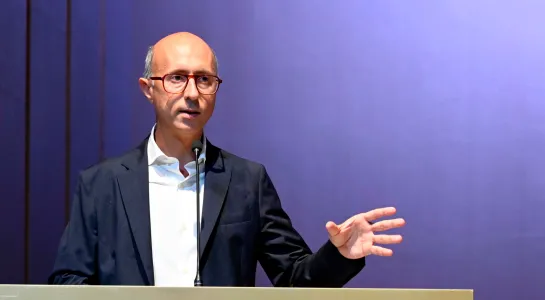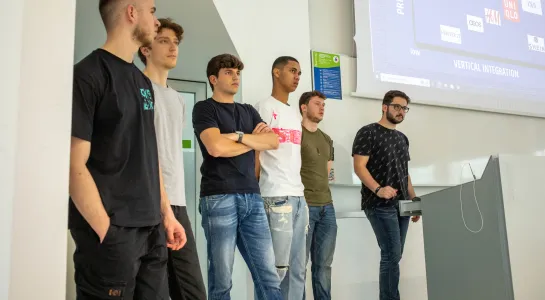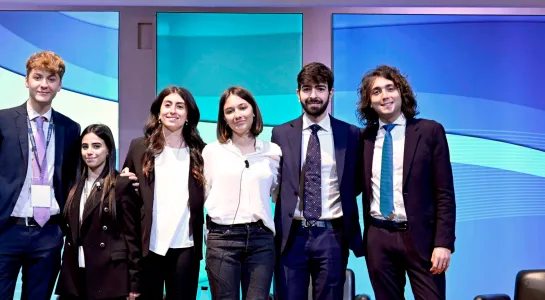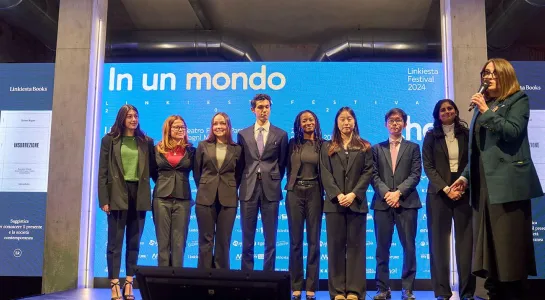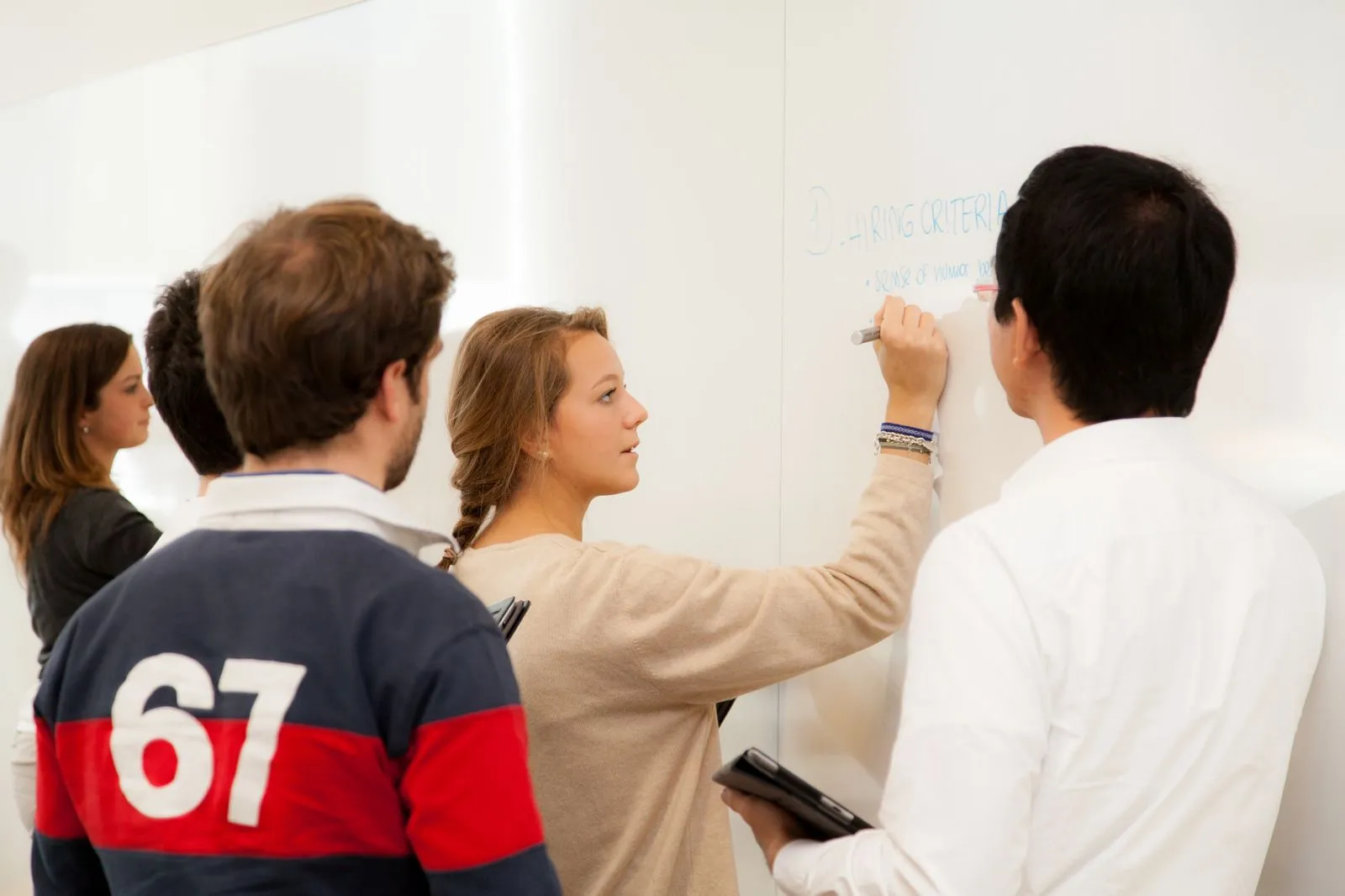
One Lesson, Many Experiences
A video interview in the first class. A debate in the second. Then, a complex online simulation in the third. Today’s students attend both traditional lessons and classes that have taken on new names and forms. Inside university classrooms, everything gets renewed by default, from new generations of students to the subjects taught, and the same happens for teaching. The desire to put students at the center of university life at Bocconi is also expressed through the goal of teaching (and learning) how to teach, improving the appeal and dynamicity of what professors do, as well as the effectiveness. This is achieved through the introduction of innovative methodologies, tools and technologies.
"One of the requests we hear the most from students is to be able to interface with all subject areas interactively," says Carlo Salvato, Full Professor in the Department of Management and Technology and Dean of the Graduate School. "It is a goal that we share. We recognize that it is not only truly effective in obtaining better results in terms of preparation, but also able to foster the growth of transversal skills because it is often associated with teamwork. Along with competition, interaction is therefore a guiding principle for enhancing collaboration, bringing classroom work closer to everyday life in the workplace. It is also a way of approaching international students, who are often already more accustomed to studying with this method in their countries of origin."
Cutting-Edge Teaching
Bocconi University Innovations in Learning and Teaching (BUILT) is a center for the promotion of research, experimentation and application of learning innovation, the ad hoc structure dedicated to teaching innovation at Bocconi. BUILT followed 82 projects in 2024, totaling 553 over the last 6 years. During the same time span, the BUILT team collaborated with faculty to build 62 multimedia cases adopted in different courses and offered to over 16,000 students (60% of the Undergraduate School), while also creating 15 online simulations adopted today in 62 course class groups. Since 2018, the center has supported about 650 faculty members in the delivery of online exams and another 600 to introduce interactive classroom methods, through one-to-one meetings, seminars and tutoring. There are also real training programs for faculty certified by ASFOR: Bocconi Excellence in Advanced Teaching (BEAT and PhD BEAT). Their goal is to prepare faculty to create effective and student-centric learning experiences, that take full advantage of the digital methodologies and tools offered by the University. "Innovation in Teaching Awards have been established this year to highlight all this work and to further emphasize the importance and quality of teaching at Bocconi," adds Salvato. "Next March 31 at 6pm, during an evening event – which will be the counterpart to Research Night – awards will be assigned to faculty in two categories. In the Student Engagement category, five courses will be awarded, one from each of the Bocconi Schools. For the Innovation in Teaching category, there are five subcategories (Blended Learning; Inclusive Teaching and Learning in Higher Education; Growth of Students' Entrepreneurial Mindset; Innovative Approaches to Assessment; and Collaboration in Learning), with three awardees for each. This teaching award initiative is something that urges faculty to consider this aspect as important. It also speaks to students to highlight that the quality of a university is not only in its research or the effectiveness of career placement, but rather it begins with the work that is done in the classroom."
How to Innovate
But how does innovation in teaching come about? "Many different skills converge in our work," explains Leonardo Caporarello, Rector's Delegate for Digital Teaching and Director of BUILT. First of all, expertise in teaching methodology is needed", followed by knowledge of the technology, the vision of a project manager and relational skills to interface with many different stakeholders, from university offices to individual faculty members, to other Teaching and Learning centers in the international arena. But above all, being a change agent, we must be aware that it is not enough to understand an innovation but it is necessary to know how to transfer its value to those who have to apply it without the risk of creating inconveniences or imbalances where there are none." Teaching, in short, is a delicate subject and this is why the proposal to introduce changes in a university course never has a single origin. "When BUILT was starting out, this is where the propulsion of innovative ideas originated," says Caporarello. "With growth in this area and evidence of good results, today faculty members themselves are taking action, perhaps asking to replicate the example of a colleague or verify the feasibility of something that they themselves have experienced. And then there are the proposals of colleagues from other organizational units, especially Technology or Academic Services, who have their finger on the pulse of the situation on the technologies in use and also on feedback from students regarding different applications."
Technology and Kinds of Technologies
Teaching innovation at Bocconi is expressed at all levels and includes a wide variety of actions, including an application that facilitates a live test in the classroom, software for a platform that allows students to work on a team on the same project and a simulation of a virtual environment where knowledge can be applied. In the first case, for example, instant polls are used to quickly verify the knowledge or understanding of a certain topic through a link or QR code. "In this case, instead of generically asking a classroom full of students 'Do you understand?' and waiting for a show of hands," explains the head of BUILT, "the instructor can prepare a short instant survey to be answered by smartphone and thus obtain a snapshot of the situation in a quick, clear and more inclusive way. It allows students to express their point of view, even anyone who may have inhibitions when speaking out publicly. In this case, the improvement is linked to the technology introduced, but more often it is the process through which innovation develops that is the real added value of the work that BUILT does: we support faculty in reflecting on how to best channel their knowledge towards students." Technology itself, moreover, would make it possible to do almost anything, even courses that are entirely online or with virtual reality applications that could replace almost any lesson. "But this is not Bocconi's direction," Caporarello points out. "The classroom remains the central locus of the teaching experience. Various forms of digital tools, including those online, are part of a blended formula that always aims to enrich ‘live’ education with simulations, exercises, challenges and competitions."
Challenges, Games and Collaborative Experiences
Students greatly appreciate innovative forms of teaching such as challenges and competitions, and it is no coincidence that there are longstanding examples at Bocconi that involve more than one class group. This is true for the Case Competition in the Economics and Management of Public Administrations course (read more). This model is also applied in the Competitive Strategy course, in which students compete in a real Business Game (read more). Not quite a game, a Collaborative Work experience is offered as part of the Event and Mega Event Management course taught by Professor Deborah Raccagni. With this activity, students apply themselves on three real projects proposed by brands or event agencies: one in the sports field, one in the cultural field and one that focuses more strictly on marketing. "The students have to draw up the masterplan of one of the events, analyzing the target positioning, designing the event as a whole and detailing the work of the individual areas, including operations, marketing, legacy and sustainability," says the faculty member. "Replicating this experience over the years, we realized that the greatest difficulty for students is not to lose sight of the initial concept when moving from ideas to their implementation. We therefore worked together with BUILT to identify a technological support that could help us. So this year we adopted the Mirò platform in the course, that guides student creativity step-by-step, helping them to be innovative but also to stay within the limits established by clients in the briefs, to arrive at a coherent concept and to put it into practice so that the event is new and unique, as required by today’s market."
Fostering Critical and Soft Skills
In Professor Andrea Colli's Economic History course, the innovative method of a televised learning experience is adopted. Video interviews prompt class discussions. Structured as a Netflix "episode" series, some are recorded live and others are pre-recorded, with the involvement of students from Sciences Po in Paris. Professor Valentina Bosetti's Climate Change Economics course’s flipped classroom also aims to help students develop critical thinking and express their point of view in collective discussion. In this case, students self-study by watching video lessons to learn some key concepts and test their preparation to get ready for a debate in the classroom and of course for the final exam. "Special takeaways" are also planned during the year, such as identifying what has been studied with the title of a song in order to create a class playlist on Spotify. Similarly, students in Professor Paola Dubini’s Management of Cultural Industries and Institutions course have a wide-ranging learning experience that also develops transversal skills. Divided into groups, they share their thoughts, but also defend positions that are not necessarily consistent with their own during two dynamic "reflection" sessions, a more structured discussion and debate, while a third team plays the role of conciliator and is tasked with finding a mutually acceptable solution.
The School of Law also offers a variety of opportunities for practicing law in action that include Moot Court Competitions, Legal Writing seminars and Legal Clinics (read more).
